New Delhi: Delhi Health Minister Satyendar Jain announced Thursday that the Arvind Kejriwal-led Aam Aadmi Party government is releasing Rs 938 crore to pay the salaries of employees of the city’s three municipal corporations. At the same press conference, Deputy CM and Finance Minister Manish Sisodia alleged that the North and East Delhi municipal corporations (NDMC and EDMC) have gone “bankrupt” and aren’t in a position to pay their employees.
“The North and East municipal corporations are bankrupt, they have Rs 12 crore and Rs 99 lakh in their bank accounts respectively. They have a loan amount of Rs 6,276 crore that they have to pay to the Delhi government. The BJP has left the municipal corporations of Delhi bankrupt,” Sisodia alleged.
“In 14 years of corrupt rule, the BJP has sucked the MCD dry. The municipal corporations are not in a state to pay the salaries of their employees. Even BJP leaders have agreed that corruption is at its peak in MCD.”
However, municipal employees feel the amount released by the Delhi government won’t suffice. “This will only help release a month’s salary, but our salaries have been pending for three months in EDMC and 6 months in NDMC,” said Vibha Singh, senior vice-president, Nagar Nigam Shikshak Sangh Delhi. She maintained that employees will not take part or help in the Covid-19 vaccination drive that begins Saturday, and teachers and safai karamcharis will hold a foot march at the Civic Centre Friday.
The two ministers’ press conference was the latest chapter in a years-long ongoing tussle for funds between the BJP-controlled civic body and the AAP-run Delhi government. It came a month after mayors and councillors staged protests against Kejriwal at his residence, claiming that the Delhi government owes the NDMC, SDMC and EDMC Rs 13,000 crore dues.
But AAP leaders, including Kejriwal and Sisodia, have insisted that it’s the BJP-ruled Centre that has to help resolve this funding crisis, insisting that the current formula of the Delhi government giving the civic bodies a cut of its tax revenue — a model unique to Delhi — is unworkable. Instead, they insist the central government must send money for the municipal bodies through the Delhi government, as it does for every other state in the country.
In fact, AAP leaders have made counter-allegations that the NDMC waived Rs 2,500 crore rent that the SDMC owed it, resulting in “a big loss to the public exchequer” — a charge BJP and municipal leaders have denied.
The AAP government, during a one-day special session of the Delhi assembly on 17 December, passed a resolution seeking a CBI inquiry into this alleged “misappropriation” by the three corporations. A few days later, AAP leaders even took out a padyatra (march) across all wards of the Delhi municipalities.
भाजपा शासित MCD में ₹2500 करोड़ का घोटाला हुआ है, ये किसी का व्यक्तिगत पैसा नहीं था।
ये दिल्ली के इतिहास का सबसे बड़ा घोटाला है। हम मांग करते है कि इस घोटाले की CBI जांच हो।- मुख्यमंत्री @ArvindKejriwal जी pic.twitter.com/AspPO5JGVN
— AAP (@AamAadmiParty) December 18, 2020
But this is hardly the first time such a battle is taking place in the national capital — on many other occasions, the Delhi government and the corporations have sparred in court over municipal employees’ salaries. In the present case too, the Delhi High Court in November 2020 had lamented the “sad situation”, stating that “unpaid MCD employees and retired staff faced the real and maximum pinch during the Covid-19 pandemic”.
ThePrint explains why this is a perennial problem in Delhi, and how it can be fixed.
Also read: Not paid for months, 22,000 Delhi civic workers threaten to boycott vaccine drive duties
The immediate trigger — Covid
The latest round of sparring began in mid-October last year, when resident doctors and paramedical staff at the Hindu Rao and Kasturba Gandhi hospitals run by the NDMC went on strike over unpaid wages. They urged Delhi Lieutenant Governor Anil Baijal to file an FIR against “authorities” for not paying their salaries for three months.
EDMC’s finance head Dr Brajesh Singh told ThePrint that the Delhi government had failed to make payments in the second quarter of 2020 due to a 57 per cent decline in revenues on account of Covid-19.
However, several municipal employees ThePrint spoke to claimed the release of salaries was being delayed since the AAP came to power.
“We didn’t face any major issue during Sheila Dikshit’s tenure (1998-2013), even though trifurcation of the corporations had happened by the end of it,” said a senior NDMC official. “Even if there were issues, the then-CM gave us loans, unlike now, when this government hasn’t released our dues.”
How are Delhi municipalities funded?
The three municipal corporations of Delhi receive their funds from two sources — external and internal revenue. Their expenditures too are divided into two categories — tied and untied.
‘External revenue’ includes the money received from the Delhi government’s pool of taxes on the recommendations of the Delhi Finance Commission (DFC). Since 2018, the Delhi government has been transferring funds according to the recommendations of the 5th Delhi Finance Commission, in which 12.5 per cent of the net tax receipts are meant to be disbursed to corporations.
‘Internal revenue’ includes the bodies’ own sources of income, such as property tax, transfer duty, electricity tax, toll tax, tax on vehicles and animals, tax on advertisement sites, tax on building applications, and education cess etc. A portion of internal revenue also comes from rent gathered from community centres, car parking, fines from cattle ponds, and illegal slaughtering.
When the MCD was trifurcated into the NDMC, SDMC and EDMC through an amendment to the Delhi Municipal Corporation Act in 2011, the bodies didn’t get an equal share of internal revenue, as the division was done on geographical lines and socio-economic factors were not considered.
This caused unequal distribution of assets, ways to generate revenue, and expenditure requirements — the SDMC, for example, got more posh colonies in its jurisdiction, and therefore more property tax etc.
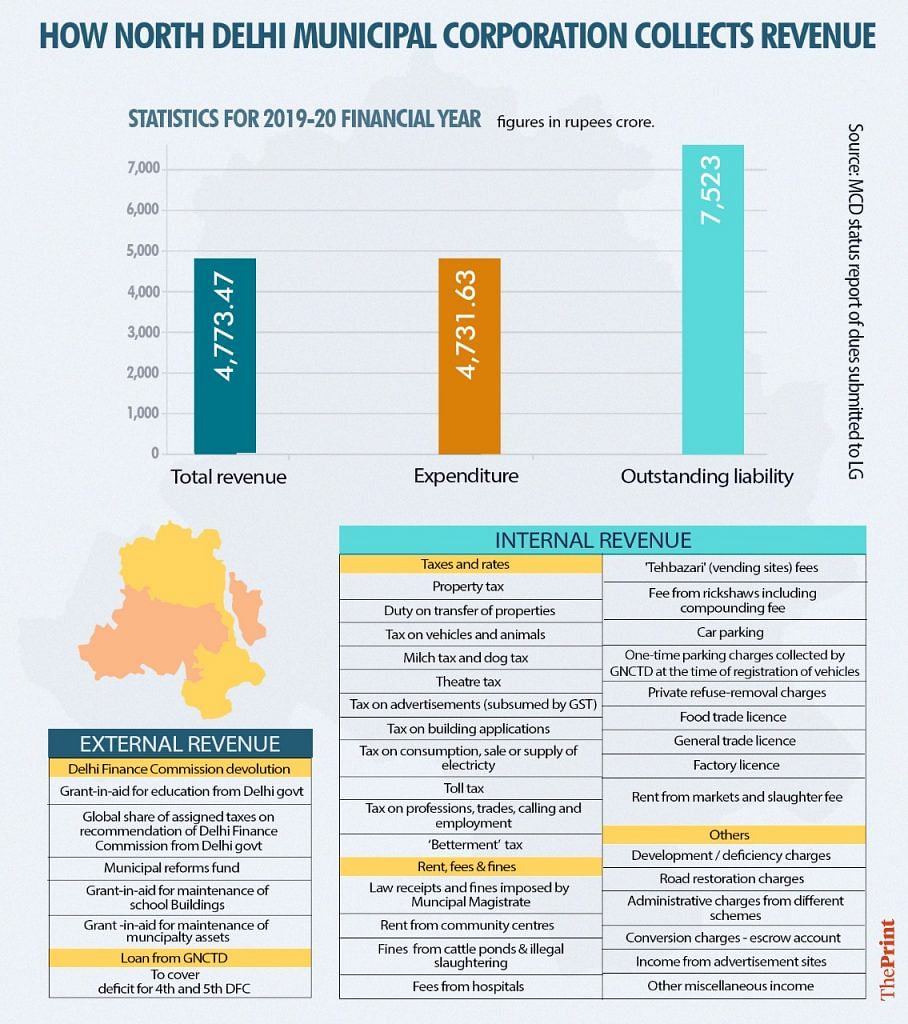
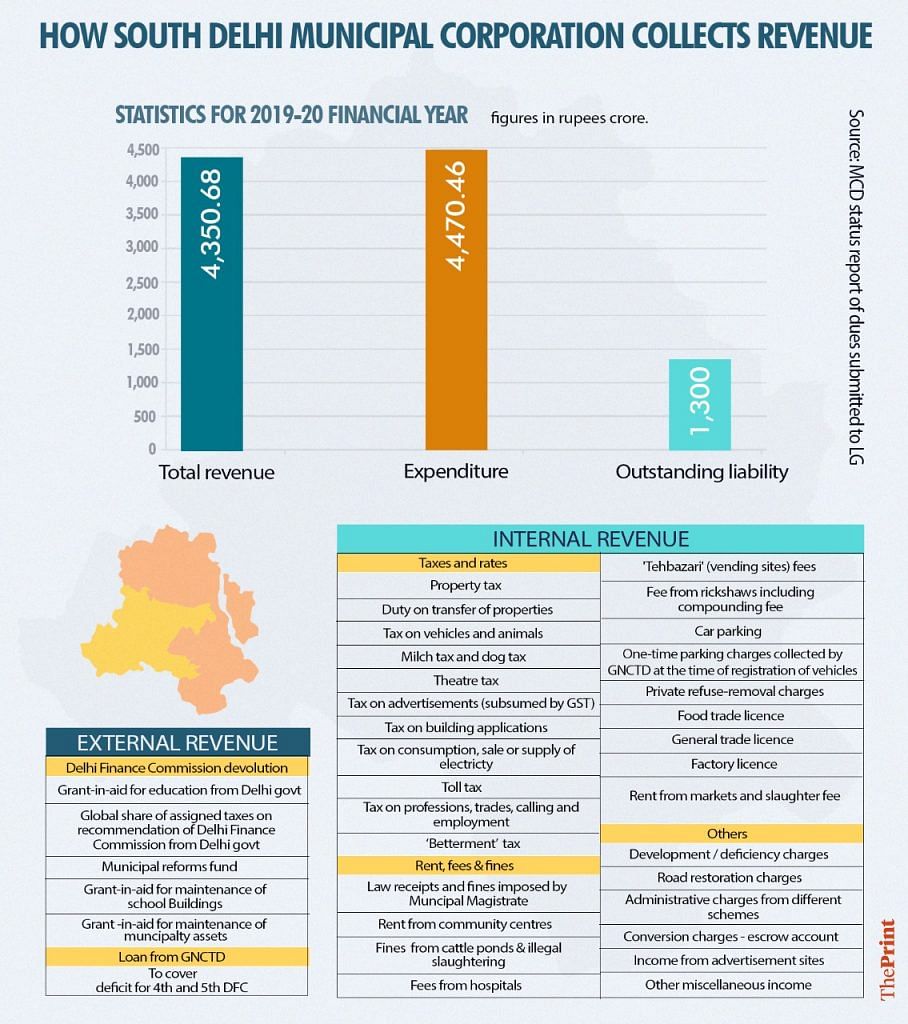
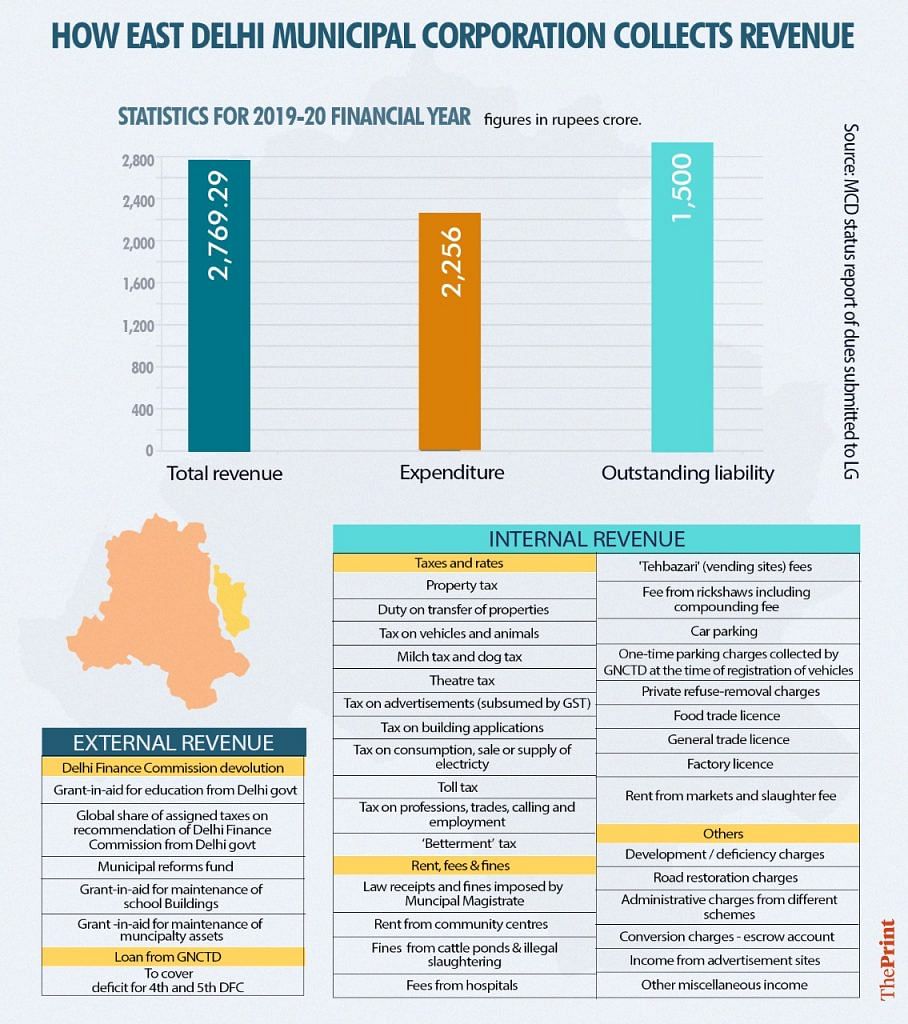
On the expenditure front, ‘tied’ expenditure includes fixed allocations for specific schemes, while ‘untied’ expenditure is flexible. Salaries, however, are included under both categories. Some of the main expenditure categories include general administration, education, health, sanitation services, public works, horticulture and discretionary expenses.
Also read: CAT orders MCD to clear pending salaries of 19,000 primary school teachers
Model unique to Delhi
The system of municipal funding in Delhi is different to that in other parts of the country, as mentioned above. In Delhi, only funds for specific schemes come from the Centre.
While Renu Sharma, special secretary in Delhi’s urban development department, refused to answer ThePrint’s queries, a senior official of the Delhi government, requesting anonymity, said: “There is no specific amount that we receive from the central government for local bodies due to Delhi’s status as a UT with a legislative assembly.”
Only a few ‘tied’ grants allotted for specific schemes are given by the Centre, the official said.
Union home ministry spokesperson Nitin Wakankar also offered no insight. “There is nothing we can share on this at this moment,” he told ThePrint.
The reason for these different rules, as pointed out by the anonymous official, is that Delhi is a union territory with an assembly. Only two other UTs in the country have assemblies — Puducherry, which the Centre decided to treat “at par with states” for the purpose of devolution of funds in October 2017; and J&K, which hasn’t had an elected assembly since it became a UT last year.
In May 2018, Delhi Deputy CM and Finance Minister Manish Sisodia suggested in a meeting with the central government that union territories with legislatures should also get the award decided by the 15th Finance Commission, which would remove the problem of municipal funding.
In October last year, Kejriwal pointed out that the Centre gives grants to all municipal corporations across the country, based on a formula of Rs 485 per person (according to a clause under the 14th and 15th Finance Commission). “However, it is not paying grants to the three MCDs for the last 10 years,” the CM said.
Given that Delhi has a population of 2.5 crore, this figure would come to about Rs 1,150 crore per year, totalling nearly Rs 12,000 crore for the past 10 years. Sisodia had reiterated the demand for Rs 1,100 crore ‘as basic and performance grant’ in July last year too.
“How do we forward an amount to the MCD which we haven’t received?” asked Durgesh Pathak, the AAP government’s MCD in-charge.
However, another senior Delhi government official, requesting anonymity, said: “The Union government can play a role if any central Finance Commissions make any such recommendation in the future,” the official said.
EDMC’s Brajesh Singh added: “It is the Delhi government which owes MCDs the money, not the Centre.”
Shakti Sinha, former Delhi finance secretary and honorary director at the Atal Bihari Vajpayee Institute of Policy Research and International Studies, told ThePrint: “While many call this a political tussle, it is also a governance issue. It is not just about BJP or AAP, as some of these issues existed even when Congress was in power. It is a complex case between Delhi and the Centre.”
Now, the NDMC has made a formal request to receive funds directly from the Centre, according to Yogender Mann, its public relations officer. “We have made a formal request to the L-G that we should receive funds from the Centre, like all the other municipalities or municipal corporations in the country,” he said.
Also read: Nurses at Delhi hospital protest not being paid for 3 months, North MCD says AAP govt to blame
3 DFCs add to confusion
Data accessed by ThePrint from a presentation submitted by the corporations to Delhi L-G Anil Baijal in October 2020 showed that the NDMC’s share of pending dues is Rs 6,635 crore, the SDMC’s share is Rs 3,162 crore, while the EDMC’s share is Rs 5,375 crore.
These figures actually add up to Rs 15,172 crore, much more than the Rs 13,000 crore being mentioned by politicians on both sides. Asked about this discrepancy, EDMC’s deputy controller (accounts) Hari Prasad told ThePrint: “This is because an MCD has added interest from the 4th Delhi Finance Commission, and some recommendations of 5th DFC weren’t accepted by the government. Since these weren’t passed, there is some variation in the calculations.”
The different DFCs have further complicated the funding problem.
Until 2018-19, the funds were paid in accordance with the recommendations of the 3rd Delhi Finance Commission, which submitted its recommendations in October 2006, for the unified MCD, as well as two other civic bodies in the city, the New Delhi Municipal Council and the Delhi Cantonment Board. This DFC suggested giving them 10.5 per cent of the Delhi government’s net tax revenue, and was supposed to be applicable from 2007-2012.
The 4th DFC, reported in December 2015, recommended a 2 per cent increase in the municipal bodies’ share of Delhi government taxes, taking the total to 12.5 per cent, applicable for the period 2012-17. It also featured a sharing ratio for each part of the trifurcated MCD, and had the provision for additional funding for specific schemes.
Municipal officials say the 4th DFC’s recommendations would’ve been able to address the fund crunch currently facing the bodies to a large extent. But they were never passed by the Delhi assembly, and officials claim a lot of financial imbalance resulted.
The 5th DFC reported in April 2016, but was implemented in 2018-19. It made almost the same recommendations as the 4th, but put the additional funding provision within the 12.5 per cent tax cut, thus giving each municipal body less money than it would get under the 4th DFC.
Prasad explained: “While the distribution formula and devolution of 12.5 per cent remains the same in both 4th and 5th DFC, the amount for certain budgetary provisions or schemes was given in 4th DFC over and above 12.5 per cent, while that amount has been included within the 12.5% in the 5th DFC.”
Now, for the past three years, the AAP government has been providing the civic bodies the prescribed funds according to the 3rd and 5th DFC recommendations.
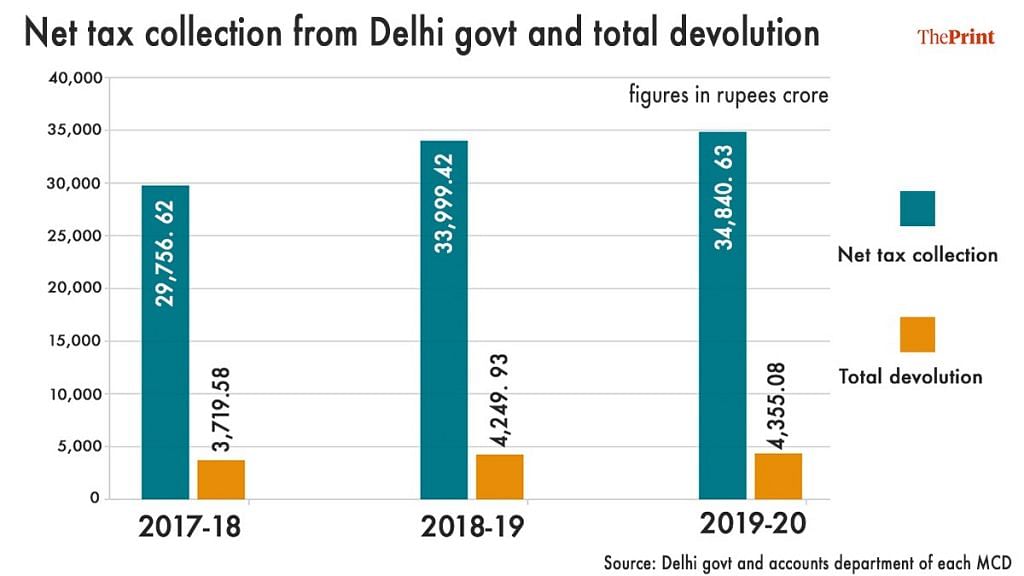
Speaking about the issue of the sharing ratio, Prasad said the 4th DFC recommended bigger shares to EDMC and NDMC, and smaller to the SDMC, given each corporation’s requirements and revenue streams. But the government allegedly ignored these recommendations, and the SDMC was given the biggest share, followed by the north and then the east. This caused a financial crisis in these two corporations while the south accumulated surplus funds.
“Without considering the 4th DFC-recommended distribution ratio, the government itself decided a ratio that made the richest municipality (south) richer and poorest poorer,” Prasad added.
An NDMC official added: “This is the reason the bodies are stressing on the (implementation of the) 4th DFC. The liabilities accumulated during this period can be disposed of if the dues are given.”
The Delhi government insists paying the dues would only be possible if Delhi’s share in the central pool of taxes was to be increased. Meanwhile, the corporations have failed to increase tax rates since 2004, even when the expenditure has increased manifold.
Loans not repaid
Sisodia has, on multiple occassions, alleged that the financial mess in the three civic bodies was of their own making. “MCD’s own internal audit report 2016-17 shows that North MCD’s chief municipal auditor found Rs 3,299 crore of financial irregularities,” he said in October 2020.
How the problem can be fixed
Former Delhi chief secretary Omesh Saigal, who headed a panel to suggest reforms for the MCD in 2006, said the trifurcation is a strong reason for why these issues are cropping up. Saigal told ThePrint that it is equally important for Kejriwal to come to a consensus with the local bodies instead of fighting with the Lieutenant Governor and shifting blame.
EDMC’s Brajesh Singh said the allocation of funds to the corporations should be reviewed and revised every five years, in view of the rise in inflation and increase in material rate, both of which impact the cost of providing municipal services.
However, K.S. Mehra, the last commissioner of the unified MCD, said the corporations must also come up with new sources of revenue, so that their dependence on external funding is reduced.
Also read: Gross mismanagement, corruption in functioning of MCDs, time to set it right, says Kejriwal
(This article has been updated with information about the three municipal corporations’ pending loan repayments)


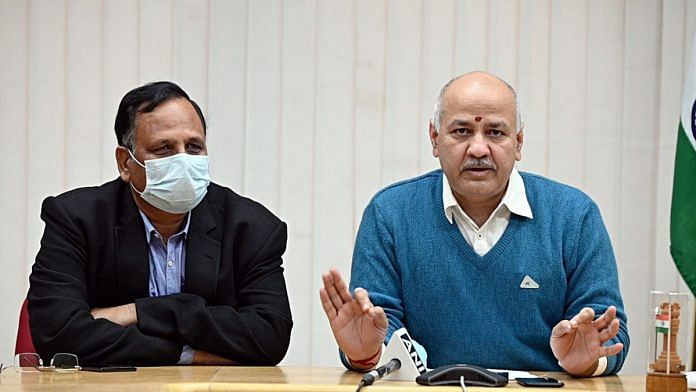

They should start charging roadside parking of cars if vested interests of media and traders are kept at bay, but in this country one cannot take tough decisions for the betterment of citizens.